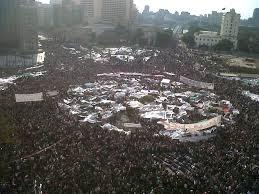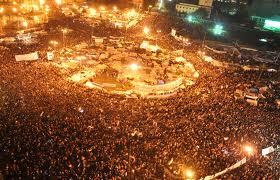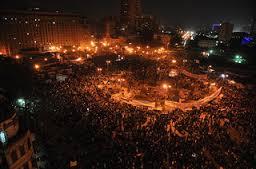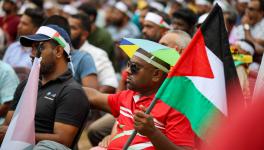Morsi Deposed as Military Steps Back into the Limelight
Finally, the 48 hour deadline issued by the military to the political parties – read President Morsi -- was over and the Armed Forces in Egypt acted by deposing him and installing an interim administration. It has suspended the constitution that the Muslim Brotherhood government had passed and announced that elections for the parliament and presidency will be held shortly. Egypt's chief justice, Adly al-Mansour will serve as the interim president till then.

A number of Muslim Brotherhood leaders have been detained, with Mosri under virtual house arrest. The media outlets of Muslim Brotherhood have also been closed with its TV stations off the air.
While it would be easy to call it a military coup, it is hard to ignore that what Egypt has seen in the recent days is probably the largest political mobilisation in recent memory. While the figures may be exaggerated – reports indicate that fully a quarter of Egypt's population was on the streets – no state can ignore the threat of millions of people on the streets. It is not enough to talk about the legitimacy of Morsi's elections as the Muslim Brotherhood is doing; political legitimacy must also mean not having large sections of your country come down on your head asking for your resignation.
After Mubarak's ouster, the military tried to run the country as the Supreme Council of the Armed Forces (SCAF). The popular mood, which at the time of first Tahrir “revolution” had not been anti military, quickly swung against the SCAF. This time around, the military has learned its lessons and is maintaining a distance; while deposing Morsi, it has put an interim civilian administration in place and not assumed powers directly. They will of course still continue to call the shots – but behind a civilian cover.

The press conference held by General al Sisi, the head of the Armed Forces, was flanked by almost all the major political forces in Egypt. Only Freedom and Justice Party, the political arm of the Muslim Brotherhood and a few of its allies were absent. Even al Nour, the Salafist party and the second largest Islamist force in Egypt after Muslim Brotherhood, was with al Sisi and welcomed the Armed Forces move. The head cleric of Al-Azhar, Ahmed El-Tayyeb, Coptic Orthodox patriarch Tawadros II, El Bareidi, the head of the National Salvation Front and the leader of the Tamorod (rebellion) Mahmoud Badr have all endorsed the Sisi road map.
By Morsi and his party refusing to engage with the political opposition and the belief that there would be no serious grass root mobilisation against them, Mosri had left little option for the opposition.
Samir Amin has welcomed, as have a number of other important left and liberal figures in Egypt,, the intervention of Armed Forces. Without such an intervention, there was only the path of dangerous physical confrontation with the Brotherhood and possible sectarian violence that the Brotherhood could unleash. Though it is easy to understand why Egyptian people wanted to get rid of Morsi and why the left and other opposition forces are happy with this intervention, it is also important to be wary about the Armed Forces and their reemergence as the centre of power in Egypt.

It is clear that the Armed Forces sees itself as the guarantor of the Egyptian nation, a role that was seriously weakened after the Mubarak overthrow and the SCAF taking over direct power. The physical intervention at the call of the opposition and the peoples' mobilisation, has paved the way for greatly increasing the Armed Forces' influence and a major role for it in future Egypt. Considering that the Armed Forces has been and continues to be the major ally of the US, this has its own risks.
Muslim Brotherhood undoubtedly did not understand that politics and democracy are not only about elections. One may win the election, but this cannot mean that it has given the winner an unbridled right to do whatever it wants. It cannot rule against the will of the people and democracy means understanding this unwritten part of democracy as well. This is the larger social compact that underlies democracy and forms it core content. Muslim Brotherhood won the elections and believed that therefore they had a right to tell the women how to dress, what should be the marriage age for women, how people should behave, what should be taught and what should be written in the media. The Prime Minister under Muslim Brotherhood rule refused to accept even court orders reinstating workers. Morsi appointed a bunch of governors, all of them from his supporters . The most controversial was the appointment of Adel Al-Khayat, a leading official of Al-Gamaa Al-Islamiya which was responsible for the massacre of 58 tourists at Luxor, as the governor of Luxor.
Muslim Brotherhood has two options now. Recognise that they have made mistakes and participate in the political process that will now reboot again in Egypt. Or to take the rejectionist position, claiming that they have been unjustly deposed and fight the way the Algerian Islamic forces did. The forces that have now succeeded in deposing Morsi must allow the Muslim Brotherhood to participate the in the new political process that will start now. Leaving them out will make them into martyrs and will not help the democratic cause. It is much better that the Brotherhood remain to be seen for what they are – a party of conservative, rich old men harking back to the past and aligning with the neoliberal global order. With a buffoon for their leader.
While Armed Forces have certainly gained legitimacy which they had lost earlier, the initiative and momentum still stays with the youth forces in Egypt. They may be naive and may not understand the larger politics of the region. But what they have shown is an ability to mobilise and strike for what they believe. How this can be harnessed for a new Egypt that breaks decisively from its neoliberal past and its alliance with the US and Israel needs to be seen.
Finally, I must end with the joke that is doing the rounds in Egypt. "Nasser, Sadat and Mubarak tried to get rid of the Brotherhood. Only Morsi succeeded."
Disclaimer: The views expressed here are the author's personal views, and do not necessarily represent the views of Newsclick
Get the latest reports & analysis with people's perspective on Protests, movements & deep analytical videos, discussions of the current affairs in your Telegram app. Subscribe to NewsClick's Telegram channel & get Real-Time updates on stories, as they get published on our website.























